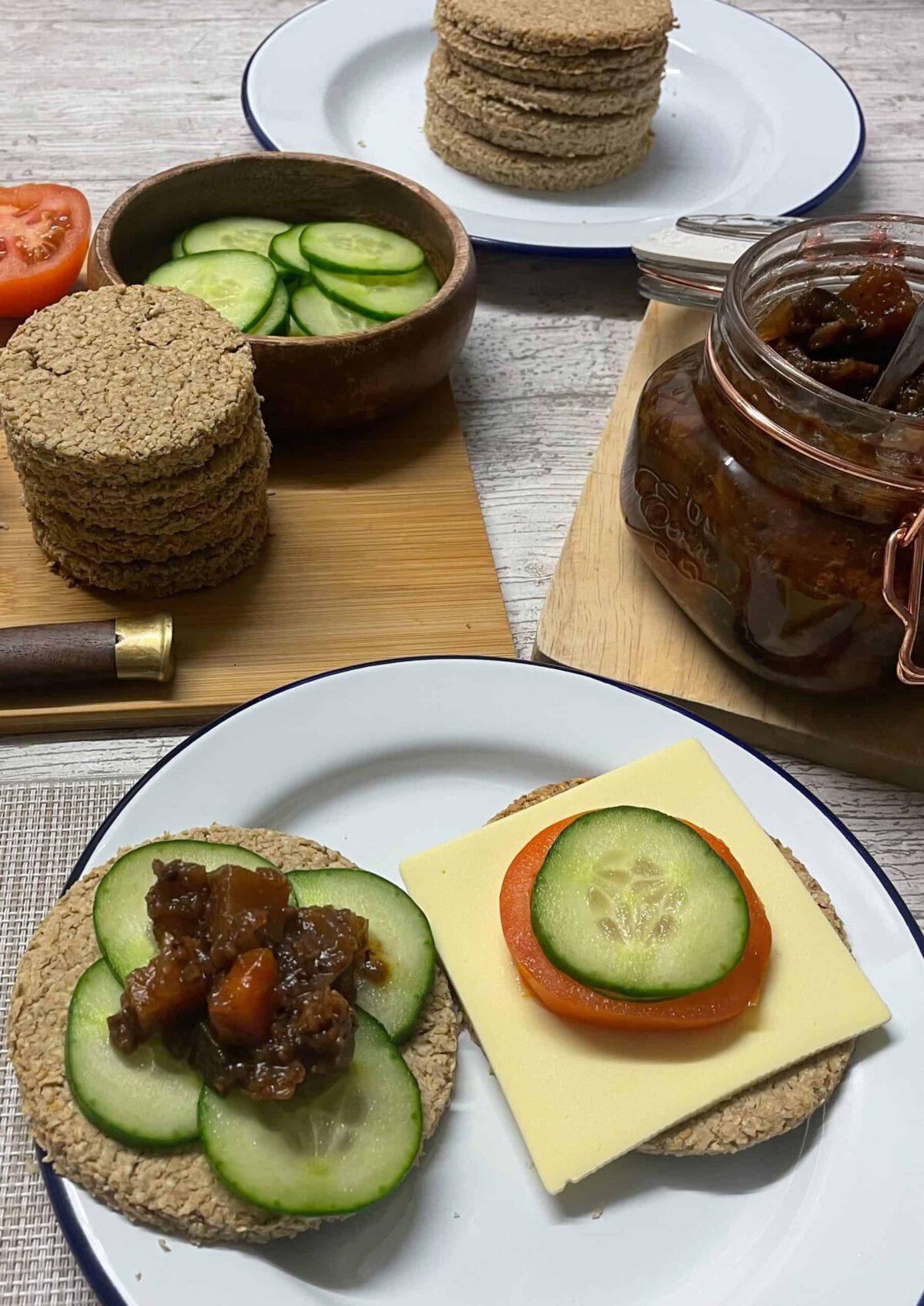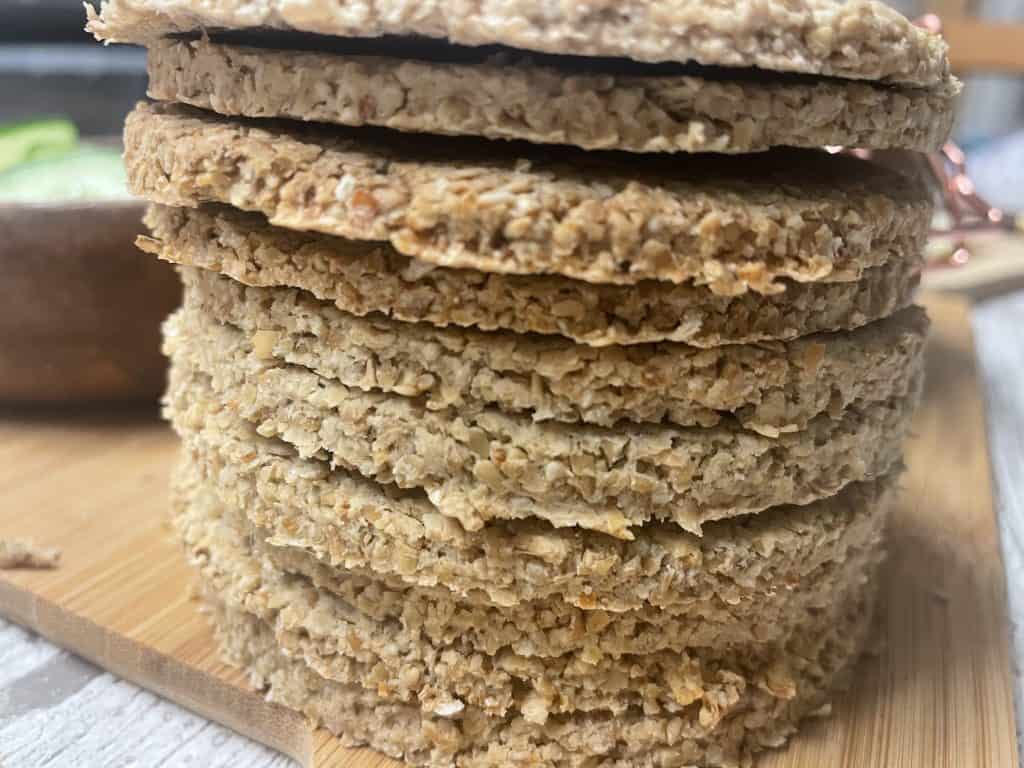Scottish vegan oatcakes are incredibly tasty and addictive! When you bite into one of these delightful Scottish treats, you'll experience a crunchy, nutty, and savoury flavour sensation.
This recipe is not only quick, easy, and simple, but it's also the only method you'll ever need to create batches of authentic, traditional oatcakes.
Looking for an oil-free vegan Scottish oatcake? Check out our easy oil-free oatcake recipe.

History of oatcakes
Oatcakes have been around in Scottish history for thousands of years.
Historically, 14th century Scottish soldiers carried their own bag of oatmeal complete with a piece of metal for cooking.
Water was added to the oatmeal to make a dough and then cooked over a fire.
Oatcakes would have helped soldiers sustain long marches and ward of hunger.
Oatcakes have been a staple in Scotland for thousands of years. Historically, 14th-century soldiers would carry their own bag of oatmeal, accompanied by a piece of metal for cooking.
They would mix water with the oatmeal to create a dough, which was then cooked over an open fire. These oatcakes provided the soldiers with sustenance during long marches and helped ward off hunger.
In literature, oatcakes are mentioned in Robert Burns' poem "The Cotter's Saturday Night" (1785), where the humble meal of a rural Scottish family includes "bannocks o' bear-meal," which are a type of oatcake.
Additionally, Sir Walter Scott's novel "Waverley" (1814) describes the protagonist enjoying a breakfast of "very thin oatcakes" during his adventures in Scotland.
Interesting facts about oatcakes:
- Oatcakes are sometimes referred to as "poor man's bread" due to their simplicity and affordability.
- In Scotland, there are regional variations of oatcakes, such as the thicker, crumblier Orkney oatcakes, and the thin, crisp Aberdeenshire oatcakes.
- Oatcakes were traditionally cooked on a "girdle" or "griddle," a flat metal plate placed over an open flame.
- Oats are uniquely suited to the Scottish climate, as they can grow in the country's cool, damp conditions where wheat struggles to thrive.
- The versatility of oatcakes allows them to be enjoyed with both sweet and savory toppings, making them a popular snack or accompaniment to meals.
Mighty benefits of the humble oat
Scottish oatcakes are the perfect snacks, as they are low in sugar and fat, while being high in fiber and plant-based goodness.
Oatcakes are a great source of antioxidants, minerals, and vitamins.
Moreover, there is evidence suggesting that oats can protect heart health, lower blood sugar, and help maintain weight, as they keep you feeling full for longer periods.
With these numerous benefits, it's an excellent reason to prepare a batch of traditional Scottish oatcakes.

How To prepare vegan Scottish oatcakes
Preparing these crisp oatcakes is easy and quick, although the first time you prepare them it may take a wee while longer until you get the hang of rolling out the dough. Although, you’ll soon be a whizz at it!

First mix the pinhead/steel-cut oatmeal, baking powder, sugar, and salt. Stir through the boiling water and oil.

Bring the mixture together into a firm dough.

Roll out the dough.

With a biscuit cutter stamp out oatcake rounds and place onto a baking tray.

Leave to cool and the oatcakes will crisp up nicely.
Recipe Notes
Oatcakes can be stored in an airtight container for up to 7-10 days. Potentially longer if kept in a dry, cool area.
For longer freshness wrap in kitchen foil before placing in the container.
Oatcakes can also be successfully frozen for up to 3 months. Probably longer if well wrapped. Wrap oatcakes in food-safe paper/foil/cling-film and if preferred place in a freezer container or just somewhere in the freezer that they won't get bashed. Place a little piece of parchment paper between each oatcake or a pile, so that it is easier to retrieve a single oatcake or small batch. Defrost at room temperature.
Oatcakes can be successfully frozen for up to 3 months. Probably longer if well wrapped.
Wrap oatcakes tightly in food-safe wrap and if preferred place in a freezer container or just somewhere in the freezer that they won't get bashed.
Place a little piece of parchment paper between each oatcake or a few, so that it is easy to pull our a single oatcake or a small batch.
Defrost at room temperature, minus the food wrap.
Yes!
Just place in the oven on a baking tray, and refresh at the cooking temperature for 5-10 minutes. Leave to cool and they should be nice and crispy again.
* divide the dough into 2 pieces for easier rolling.
* sprinkle a generous amount of oatmeal on your board before rolling to prevent oatcake dough sticking as the dough is rolled out quite thin. Also rub some oatmeal dust or a little flour over your rolling pin.
* gently but firmly press down on to the oatmeal dough with the rolling pin at the beginning of rolling it out, as being too heavy handed can end up with the dough flaking.
* pinch the oatcake dough back together if it gets a little flaky at the edges while rolling out.
* if your dough is too dry dab some water onto your fingers and work it into the dough by patting it and sticking the dough together.
* if your dough is too wet just sprinkle more oatmeal over.
For a different shape, roll out the dough into a small dinner plate sized circular shape.
Use a knife to cut each circle into 4 triangles. Each triangle is traditionally known as a farl.
* peanut butter, almond butter or sunflower butter
*vegan cream cheese, wedges of vegan cheese
* various salad veggies
*pickles, pates, savoury spreads
* guacamole
* salsa
* hummus
* a pat of vegan refried beans
* lentil pate, check out our harvest pumpkin and red lentil flan recipe as the filling can also be used as a delicious pate
* a dollop of jam/jelly
* vegan-friendly chocolate spread
* chopped banana
Tasty Soups and Stews That Pair Well With A Few Scottish Oatcakes
Looking for an oil-free Scottish vegan oatcake?
Oil-Free Traditional Scottish Vegan Oatcakes
Oil-Free Traditional Scottish Cheesy Oatcakes
📖 Recipe
Traditional Scottish Vegan Oatcakes
Equipment
- Baking trays
- Biscuit/cookie cutter about 6-7cm diameter for smaller oatcakes and about 8-9 cm for larger oatcakes.
- Rolling pin
Ingredients
- 620 grams Medium-cut/pinhead/coarse/Irish oatmeal (not rolled or porridge oats) plus extra for sprinkling during rolling out
- 1 teaspoon Baking powder
- 1 teaspoon Caster sugar or granulated, date or coconut sugar, or an alternative sweetener.
- 1 teaspoon Salt
- 300 millilitres Boiling water use a little extra as required
- 4 tablespoon Vegetable oil
Instructions
- Preheat the oven to 170 Fan/ 190 Celsius/ 375 Fahrenheit/ Gas 5.Mix the oatmeal, salt, sugar, and baking powder together in a bowl.620 grams Medium-cut/pinhead/coarse/Irish oatmeal (not rolled or porridge oats), 1 teaspoon Baking powder, 1 teaspoon Caster sugar, 1 teaspoon Salt
- Pour the boiling water into a jug.300 millilitres Boiling water
- Add the oil to the oatmeal and mix.4 tablespoon Vegetable oil
- Pour the boiling water into the oatmeal mix.Mix everything together.
- Bring the mixture together into a firm dough. Knead gently but firmly to bring it all together.Sprinkle oatmeal on your worktop and place the oatmeal dough on top.
- Pat down the warm oatmeal dough with your hands. Squeeze together any cracked bits. It should easily mould back together. A little water dabbed and smoothed over the cracks with your fingertip can help bring the dough back together.(To make rolling easier the dough can be halved and one part rolled/patted out at a time).If your dough is too sticky just sprinkle more oatmeal over.
- Roll out gently. This part can take a little time. Roll out until very thin to about half a cm.
- I usually use a 6 cm biscuit cutter to gently stamp out circles. I have also used an 8 cm cutter as I love large oatcakes.But any size will do.Just give the cutter a little shoogle to remove the oatcake or you may need to use a spatula to carefully scoop up the oatcake.
- Once all the oatcakes have been cut out and the ends of dough are left, squish it all back together and roll out. Sprinkle more oatmeal over your worktop. Repeat until all the dough has been used.
- Place the oatcakes in the oven until lightly golden at the edges and the top is firm to touch. Don't bake till dark golden.You can bake your oatcakes on any shelf in your oven as you may need to add several trays at once. Just check each tray as the top tray may be done before the ones under it.Smaller oatcakes should be ready between 18-22 minutes. Check after 18 minutes especially if your using a fan oven.Larger oatcakes may need 23-25 minutes. Or a few minutes longer depending on your oven.
- Leave the oatcakes for a few minutes on the baking tray before removing on to a wire rack to cool completely.
Notes
- Nutritional information is provided for guidance only and is not a strict calculation as ingredients vary.
- Do check out the recipe notes and FAQS section for top tips on preparing Scottish oatcakes.
- Oatcakes will keep fresh wrapped in kitchen foil, and/or an airtight container for up to 7-10 days. Possibly longer if well wrapped and kept in a cool, dry place.
- Oatcakes can be frozen, well wrapped to avoid freezer burn, for up to 3 months. Place a piece of kitchen paper between each oatcake or a small pile, so its more easy to remove a few from the freezer. Defrost at room temperature and if necessary pop back in the oven (at the cooking temperature) for 5-10 minutes to re-fresh and re-crisp.
- Oatcakes are a delicious sub for bread to serve with stews and soups.
- Or have a few oatcakes for lunch with slices of tomatoes, cucumber and vegan cheese. A scoop of pickle is also tasty as is a pat of vegan cream cheese.
- Oatcakes are a wonderful starter for a special meal especially served with some tasty vegan pate, hummus or refried beans.
Nutrition
If you love these tasty oatcakes then it would be wonderful if you would share the recipe on your favourite social media sites.
Don’t forget to tag us using @traditionalplantbasedcooking or #traditionalplantbasedcooking
Any comments, feedback, or concerns are very much appreciated.
Thanks so much, Jacq x
Leave a Reply